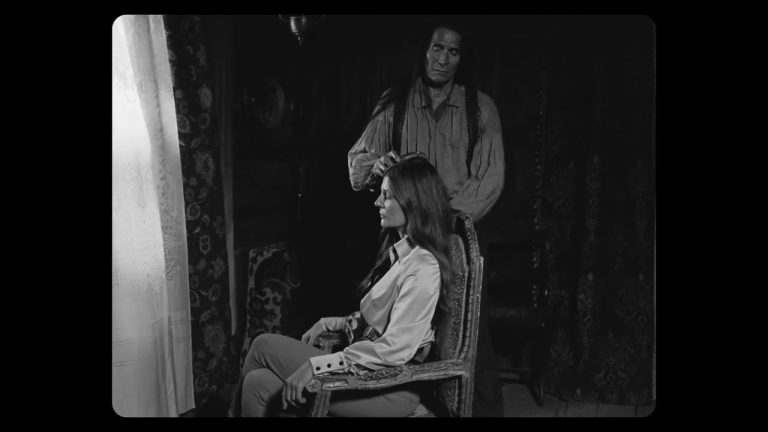
Across Time And Space, ‘Eureka’ Unravels Identity And Belonging In Cinema
12 February, 2024Directed by the Argentine filmmaker Lisandro Alonso, Eureka stands as a masterful work of cinema, boldly defying categorisation by smoothly blending elements of the Western genre, Indigenous culture, colonialism trauma, and existential exploration. Alonso assembles a diverse cast including acclaimed actors like Viggo Mortensen and Chiara Mastroianni, alongside Maria Medeiros and non-professional actors, to bring his visionary narrative to life (or dream!) on screen.
Shot across five countries, from the Pine Ridge Native Reservation in South Dakota to the South American jungles and Sergio Leone’s western settings in Almería, Spain, Eureka presents a nuanced exploration of Indigenous identity and resilience. Through the juxtaposition of various time periods and geographical regions, Alonso prompts viewers to reflect on the enduring influence of political and economic dynamics on Indigenous communities.
Amidst the captivating coastal landscape, portrayed in striking black-and-white with a round-cornered frame ratio, the film introduces an elderly Native American man deeply engrossed in a drumming and chanting ritual atop a cliff overlooking the sea. As the Native makes his way inland, climbing another rock, he sees a horse-drawn wagon approaching, guided by a dubious nun. The wagon halts abruptly as Murphy, portrayed by Viggo Mortensen, begins his journey across desolate terrain to reach a remote town in decline. Against the backdrop of Western America in 1870, Murphy finds himself immersed in a world where life comes cheap, and violence prevails.
With unwavering confidence, Chiara Mastroianni’s character, ‘El Coronel’, enters the town’s salon and takes her seat across from Murphy. This moment blends Western archetypes with insightful dialogue, adding depth to the narrative. We discover that Murphy is after his missing daughter, when he finds himself confronting Randall, played by the Iranian director Rafi Pitts. This confrontation takes a surprising turn when Murphy’s own daughter enters the scene, leading to a tense standoff, all captured on a television screen, blurring the lines between reality and fiction. Transitioning to present-day 2019, a breaking news report interrupts, forecasting heavy snowfall in South Dakota’s White Clay and Pine Ridge, areas home to the ‘beautiful’ Native community, where officer Alaina prepares for her shift amidst the impending storm.
As Eureka unfolds, its deliberate pacing draws viewers into an immersive sensorial journey, offering ample time for reflection on the unfolding events. This fosters a profound engagement with the depicted space and time, encouraging contemplation of themes such as Indigenous identity and the intricate ties to cultural heritage and land. Among this contemplative atmosphere, the film delves into the deep sense of isolation and alienation experienced by Native characters living in South Dakota’s Reservation, who feel disconnected from society and themselves. The desolate and eerie landscapes, remote villages and fragmented communities reflect the characters’ ongoing struggles to establish meaningful connections and find a sense of belonging in an indifferent world.
Alaina’s solitary journey as an officer is fraught with frustration and challenges, highlighting the weight of her dual roles as law enforcer and community member. Dealing with intoxicated and volatile locals, conducting searches for missing children, and aiding stranded individuals only serve to compound her responsibilities. Despite the monotony that often characterises her futile routine, her niece Sadie, a basketball coach, provides a source of motivation amid the daunting challenges she meets.
Sadie’s crucial role in coaching local youth contrasts with the community’s struggle against a surge in youth suicide, shedding light on the challenges they confront. Despite her supportive demeanour during a visit to her brother in jail, Sadie wrestles with her own inner conflicts. Eventually, she seeks guidance from her ancestral grandfather, leading to an intense and ethereal journey of transformation and departure.
The film then swiftly transports viewers to the Amazon Forest in the 1970s Brazil, where a local community engages in daily rituals, sharing dreams reflecting their struggles against outside encroachment while also expressing a deep connection to their natural surroundings and heritage. As twilight falls, a Ford pickup truck emerges on a winding forest road, its fog lights piercing the darkness. A radio presenter broadcasts a speech by Geisel, Brazil’s late 1974 president, discussing global uncertainties and his economic development plans for the nation’s northern region – initiatives that will result in dire consequences for local Indigenous communities, affecting their lands and way of life. The film touches on capitalism and modern slavery, portraying how Indigenous communities are enticed to pursue better living conditions by emulating the paths of white settlers, reminiscent of the gold rush era.
At its core, Eureka is a meditation on the complexities of human existence and the enduring legacy of colonialism. Through its diverse cast of characters and interwoven narratives, the film explores the ways in which history shapes individual lives and communities, while also highlighting the resilience and strength of marginalised voices. Despite its unconventional structure and elliptical storytelling, Eureka appears as a heartfelt contemplation on the nature of existence and the search for meaning in an uncertain world. As viewers journey alongside the characters through landscapes both physical and metaphysical, they are left to ponder the eternal questions that lie at the heart of the human experience.
Once again, Alonso pushes the boundaries with his daring and visionary film, urging audiences to broaden their horizons and embrace the unknown. With captivating visuals, evocative performances, and thought-provoking themes, the film offers a transcendent cinematic experience that lingers long after the credits roll.
Eureka premiered at the Cannes Film Festival in 2023 and will be in UK cinemas from 16
Follow Sounds and Colours: Facebook / Twitter / Instagram / Mixcloud / Soundcloud / Bandcamp
Subscribe to the Sounds and Colours Newsletter for regular updates, news and competitions bringing the best of Latin American culture direct to your Inbox.

